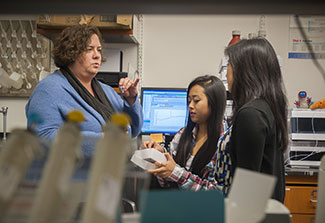
Fogarty investment in early-career scientists pays off
July / August 2017 | Volume 16, Issue 4

Photo by Sean Flynn/UConn
The more than 75 recipients of grants from a Fogarty
program to nurture early-career scientists - such as
Dr. Marcy Balunas (left) of the University of Connecticut
- now form a cadre of productive, independent global health
researchers, according to a recent program evaluation.
program to nurture early-career scientists - such as
Dr. Marcy Balunas (left) of the University of Connecticut
- now form a cadre of productive, independent global health
researchers, according to a recent program evaluation.
A cardiologist who identifies cost-effective strategies to address heart disease, a microbiologist who supports vaccine development, and a chemist who studies marine life to find new drugs are making very different contributions to global health, but have something in common. They've each held a Fogarty grant designed to help U.S. researchers launch their careers, and they are representative of the grant program's success.
The International Research Scientist Development Award (IRSDA) program has supported more than 75 investigators since it began in 1999. A recently published evaluation of the program, conducted by Fogarty analysts, concludes the IRSDA "has successfully developed a cadre of productive, independent global health researchers," as measured by the findings they've published, the careers and collaborations they've established, and the subsequent funding they've secured.
The awards support three to five years of mentored clinical or non-clinical research in low- and middle-income countries (LMICs). Grantees are required to spend significant time conducting research in the LMIC and have mentors from both a U.S. and LMIC institution. The stipulation is intended to foster collaborations and increase the likelihood that research findings can inform policy or practice at the local level in the host country.
"Living and working in a developing country gives you a better understanding of the country and helps build relationships, which are essential to a career in global health research," explains Fogarty Director Dr. Roger I. Glass. "Finding the time for field research isn't always easy for junior investigators who are balancing new administrative duties, grant applications and teaching responsibilities. The IRSDA addresses that problem by providing salary and support so they can have protected time to conduct global health research."
U.S. investigators with doctoral degrees can apply with a research proposal in any discipline, providing the topic is relevant to the LMIC.
The evaluation, which covered 1999-2016, found that most of the research projects (64 percent) have focused on infectious diseases, but there has been an increase in applicants pursuing noncommunicable disease and implementation science research. Grantees have worked in 33 countries across six world regions. Roughly half of the funded projects were in sub-Saharan Africa and a quarter were in Latin America.
Awards have been fairly evenly distributed between women (56 percent) and men (44 percent) and between M.D.s (47 percent) and Ph.D.s (41 percent), signaling the IRSDA is successfully attracting both basic science and clinical research applicants.
Program alumni have a high publication rate. They've been authors on more than 1,560 articles in peer-reviewed publications. More than 85 percent of alumni currently have a career in global health research. About 43 percent of grantees have received subsequent NIH funding - of those, 80 percent secured R01, U01 or P01 grants, which are viewed as a sign of scientific independence.
To further develop a robust global health workforce, Fogarty developed a program for early-career LMIC researchers in partnership with several NIH institutes. Modeled on the success of the IRSDA, the Emerging Global Leader Program launched last year.
"These awards are some of the best investments we make," said Glass. "By nurturing these early-career scientists, we are helping seed the next generation of global health leaders whose discoveries will benefit health for years to come."
More Information
- International Research Scientist Development Award (IRSDA) for U.S. scientists
- Fogarty Emerging Global Leader Award for LMIC scientists
- Resources and publications related to the article IRSDA alumna Dr Marcy Balunas explores marine life to find new drugs:
- Balunas Research Group at the University of Connecticut
- Related IRSDA grant: Tropical Disease Drug Discovery from Marine Cyanobacteria in Panama
- International Cooperative Biodiversity Groups (ICBG)
- Related ICBG grant: Training, Conservation and Drug Discovery Using Panamanian Microorganisms
- Other grant awards to Dr. Balunas supported by NIH
- Related news: The science of symbiosis and the search for new drugs
UConn Today, January 19, 2016 - Related news: The quest for new cancer-fighting drugs in marine environments
UConn Today, December 19, 2012 - Resources and publications related to the article Fogarty support launches career in infectious diseases for Dr Jeffrey Bethony:
- The Bethony Lab at George Washington University School of Medicine and Health Sciences
- Related IRSDA grant: Bethony International Research Scientist Development Award
- Other grant awards to Dr. Bethony supported by NIH
- Related news: George Washington University researchers close in on hookworm vaccine
GW School of Medicine and Health Sciences news, May 4, 2013 - Resources and publications related to the article Cardiologist Dr Thomas Gaziano examines cost-effective strategies:
- Related IRSDA grant: Cost-effective prevention of cardiovascular disease
- Other grant awards to Dr. Gaziano supported by NIH
- South Africa Center of Excellence to Combat Chronic Diseases supported by NHLBI
- Disease Control Priorities Project
- Related news: Reducing the guesswork and cost of rating heart disease
Sep/Oct 2011 Global Health Matters - Related news: Inexpensive polypills may add years for heart patients
Sep/Oct 2011 Global Health Matters - Views of Fogarty@50 by Dr. Gaziano
To view Adobe PDF files, download current, free accessible plug-ins from Adobe's website.






















.png)











No hay comentarios:
Publicar un comentario